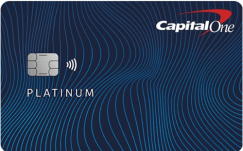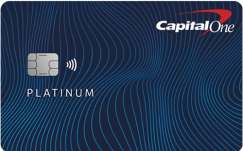At Experian, one of our priorities is consumer credit and finance education. This post may contain links and references to one or more of our partners, but we provide an objective view to help you make the best decisions. For more information, see our Editorial Policy.
Using a credit card can help teens build a credit history, making adult tasks such as renting an apartment easier. People under 21 are restricted from opening their own credit card accounts without sufficient income or a cosigner, which can complicate things for teens looking to get started with credit.
The good news: Teens can access credit via student credit cards, secured cards and even some unsecured cards, as well as by becoming an authorized user on a parent or other loved one's credit card account.
Here are the best credit cards that can help teens establish a credit history.
3 Partner Offers
The OpenSky® Secured Visa® Credit Card
You say your teen has no credit history or bank account? They don't need either to apply for The OpenSky® Secured Visa® Credit Card. Instead, applicants make a refundable security deposit of at least $200, which generally becomes their credit limit. If the cardholder stops making payments, the card issuer can keep the deposit to cover the card's outstanding balance. The annual fee is $35; the ongoing APR is 25.14% Variable.
The OpenSky® Secured Visa® Credit Card reports to all three major credit bureaus. However, there's no option to upgrade to an unsecured card. If your teen has a bank account, you may want to consider a secured credit card with rewards, no annual fee and the option to upgrade.

The OpenSky® Secured Visa® Credit Card
on Capital Bank N.A.'s website
Recommended FICO® Score*
The OpenSky® Secured Visa® Credit Card
APR
25.14% Variable
Intro APR
Rewards
None
Annual Fee
$35
Card Details
- New feature! Earn up to 10% cash back on everyday purchases.
- No credit check to apply. Zero credit risk to apply!
- Looking to build or rebuild your credit? 2 out of 3 OpenSky cardholders increase their credit score by an average of 41 points in just 3 months.
- Get free monthly access to your FICO score in our mobile application
- Build your credit history across 3 major credit reporting agencies: Experian, Equifax, and TransUnion
- Add to your mobile wallet and make purchases using Apple Pay, Samsung Pay and Google Pay
- Fund your card with a low $200 refundable security deposit to get a $200 credit line
- Apply in less than 5 minutes with our mobile first application
- Fund your security deposit over 60 days with the option to make partial payments
- Over 1.4 Million Cardholders Have Used OpenSky Secured Credit Card To Improve Their Credit
Capital One Platinum Secured Credit Card
The Capital One Platinum Secured Credit Card can help your teen build credit through responsible use. This secured card has no annual fee and offers the ability to qualify for a low security deposit. The required refundable security deposit starts at $49 to get a $200 initial credit line.
Even if you don't qualify for a lower deposit, you may qualify to get your deposit back as a statement credit when you use your card responsibly, like making on time payments. You may also be automatically considered for a higher credit limit in as little as six months, with no additional deposit needed.

Capital One Platinum Secured Credit Card
on Capital One's website
Recommended FICO® Score*
Capital One Platinum Secured Credit Card
APR
29.99% (Variable)
Intro APR
Rewards
None
Annual Fee
$0
Card Details
- No annual or hidden fees. See if you're approved in seconds
- Building your credit? Using the Capital One Platinum Secured card responsibly could help
- Put down a refundable security deposit starting at $49 to get a $200 initial credit line
- You could earn back your security deposit as a statement credit when you use your card responsibly, like making payments on time
- Be automatically considered for a higher credit line in as little as 6 months with no additional deposit needed
- Enjoy peace of mind with $0 Fraud Liability so that you won't be responsible for unauthorized charges
- Monitor your credit score with CreditWise from Capital One. It's free for everyone
- Get access to your account 24 hours a day, 7 days a week with online banking to access your account from your desktop or smartphone, with Capital One's mobile app
Capital One Platinum Credit Card
Teens who don't want to put down a security deposit can look to the unsecured Capital One Platinum Credit Card. This card is very similar to the Capital One Platinum Secured Credit Card as it has no annual fee and the opportunity to receive a credit limit increase in as little as six months.
Since it's an unsecured credit card, you don't need a security deposit to open your account. There is no rewards program, but if you responsibly use this card to build good credit, you can qualify for a rewards card in the future. See rates and fees.

Capital One Platinum Credit Card
on Capital One's website
Recommended FICO® Score*
Capital One Platinum Credit Card
APR
29.99% (Variable)
Intro APR
Rewards
None
Annual Fee
$0
Card Details
- No annual or hidden fees. See if you're approved in seconds
- Be automatically considered for a higher credit line in as little as 6 months
- Help build your credit through responsible use of a card like this
- Enjoy peace of mind with $0 Fraud Liability so that you won't be responsible for unauthorized charges
- Monitor your credit score with CreditWise from Capital One. It's free for everyone
- Get access to your account 24 hours a day, 7 days a week with online banking from your desktop or smartphone, with Capital One's mobile app
- Check out quickly and securely with a contactless card, without touching a terminal or handing your card to a cashier. Just hover your card over a contactless reader, wait for the confirmation, and you're all set
- Pay by check, online or at a local branch, all with no fee - and pick the monthly due date that works best for you
What Are the Rules for Teenagers and Credit Cards?
The Credit Card Accountability Responsibility and Disclosure (CARD) Act of 2009 prohibits credit card issuers from granting new accounts to anyone under age 21 unless they have an adult cosigner or demonstrate sufficient income to repay debt.
That income may come from a job, if the teen works, or other means such as scholarships, grants or a trust fund. Without an income, it's still possible to get a cosigned credit card where the teen is the primary cardholder and responsible for paying the credit card bills. If the teen can't pay, responsibility shifts to the cosigner. Debt on the cosigned card is included in the cosigner's debt-to-income ratio, possibly making it harder for them to get approved for credit.
But few credit card issuers today allow credit card cosigners, and teens under age 18 can't get cards in their own name, even with a cosigner or proof of income. However, many credit card companies allow minors to be on an adult's account as authorized users.
Becoming an Authorized User on a Parent's Card
The primary cardholder on an authorized-user account is responsible for the bill, although the authorized user may be able to make payments. Being added as an authorized user on a credit account typically means the account is then added to your credit reports, which can help build credit.
The status of the account can affect the potential benefit it has, however. For instance, an account with a low credit utilization ratio, a long history and a record of on-time payments will have the most positive effect.
Before adding a teen as an authorized user, ask if the card issuer reports authorized-user accounts to credit bureaus and if there are any age restrictions. Some card issuers require authorized users to be 13, 15 or 16; others have no age requirements.
What if I Can't Be an Authorized User?
Young people 18 years of age and older who can't become an authorized user on a credit card may qualify for two other options in their own names:
- Student credit cards are designed for college students just starting to build credit. A credit check and earned income are required to qualify for student cards; most (though not all) also require college enrollment. Student cards may offer benefits such as low introductory APRs, travel rewards or cash back.
- Secured credit cards (such as The OpenSky® Secured Visa® Credit Card above) require a refundable security deposit, which typically establishes the card's credit limit. The issuer keeps the deposit if the cardholder stops making payments, making card issuers more willing to extend credit to those with no credit history. Aside from the deposit, secured credit cards work just like any other credit card. Used responsibly, secured credit cards can help you build your credit history.
What About Prepaid Cards?
Prepaid credit cards look like regular credit cards, but function more like debit cards. You put money into a prepaid card account and use the card to make purchases up to the amount in the account. As the balance shrinks, you can usually "reload" the card with more money.
Regular credit cards are revolving credit; users borrow money from the card issuer for purchases and pay it back. These payments are reported to credit bureaus, helping to build a credit history. But because you aren't borrowing any money when using a prepaid card, there are no payments to report to credit bureaus, so using the card won't help build credit.
Help Your Teen Learn to Use Credit
Getting a credit card can help teens build credit and learn financial responsibility. Before your teen starts searching for a credit card, have them check their credit report and credit score, if they have one. Knowing what (if anything) is in their credit history will help your teen determine what credit card is best for them.

